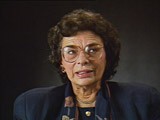You searched for: jewish
<< Previous | Displaying results 2301-2325 of 2504 for "jewish" | Next >>
-
Jehuda Gerszonowicz
ID CardThe third of eight children, Jehuda was born in the predominantly Jewish town of Wodzislaw, about 45 miles north of Krakow. Jehuda's father was a mechanic and locksmith, and had trained Jehuda and his brothers in the trade. Jehuda eventually opened his own shop in the nearby town of Miechow. He had eight children--five sons and three daughters--by two marriages. 1933-39: All this summer Jehuda has been glued to the radio, as the number of skirmishes between the German and Polish border guards have…
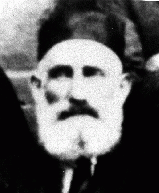
-
Jolan (Cipi) Katz
ID CardThe oldest of eight children, Jolan grew up in a religious Jewish family. She was usually known by her Yiddish nickname, Cipi. After Jolan was born, her parents moved the family to Kisvarda, a town in northeastern Hungary. There she grew up with her four sisters and one surviving brother. Jolan had finished her schooling by 1933. 1933-39: Hitler was popular in Kisvarda. Jolan's mother wanted the family to leave Hungary before the situation worsened, but her father, who had been to the United States…
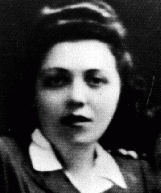
-
Izabella Katz
ID CardIzabella was one of eight children raised in a religious Jewish family in the small town of Kisvarda in northeastern Hungary. Every Friday Izabella and her brother and four younger sisters went to the library to borrow the maximum number of books for their mother. Izabella attended public schools and longed to move to a big city. 1933-39: Antisemitism was prevalent. Izabella can't count the number of times she was called "smelly Jew." Her family cringed at "Heil Hitler" speeches from Germany on the radio…
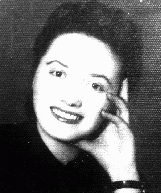
-
Onti Lazar
ID CardOnti, the youngest of five sons, was born to religious Jewish parents in northern Transylvania, a region of Romania that had belonged to Hungary until 1918. Onti's family usually called him Usher, which was the diminutive of his Yiddish name, Anschel. As a little boy, he liked collecting figurines. Though Onti grew up in a Hungarian-speaking home, he attended Romanian public schools. 1933-39: At age 13 Onti quit school to help make ends meet. He wanted to become a watchmaker, but he settled on working as…
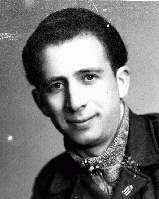
-
Josef Malnik
ID CardRaised in a Jewish family, Josef lived with his wife, Feiga, in Kovno, a cosmopolitan city that was picturesquely situated at the juncture of two rivers and was known as the "Little Paris." Josef was a barber, his wife was a beautician, and together they ran a shop in downtown Kovno. 1933-39: Every day Josef and Feiga walk to their shop which is not far from their house. It's hard work being a barber--Josef is on his feet most of the day, seven days a week including a couple of hours on Sunday. He has…
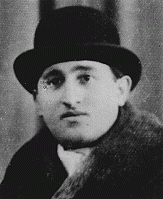
-
Chaim David Jegher
ID CardDavid was one of six children born to religious Jewish parents in Rona de Jos, a town in northwest Romania. The Jeghers subsisted through a variety of enterprises. Besides farming, they bottled their own wine and brandy and produced dried fruit for distribution in Romania and in parts of Czechoslovakia and Hungary. David's father also ran a local transportation and delivery service. 1933-39: Religious school was from 6:30 to 8:00 a.m. David's mother would wait outside the building with some breakfast for…
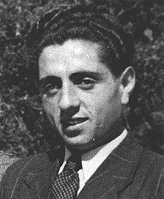
-
Ida Szczupakiewicz
ID CardIda was the oldest of three children born to a Jewish family in northeastern Poland in Malkinia, a town situated on the right bank of the Bug River. Ida's father was a grain merchant and her family lived in the same house that her grandfather had owned. 1933-39: Ida was 9 when Germany invaded Poland. At once her family hid on some nearby farms but a few weeks later they returned home. When their neighbor, her father's best friend, became a Nazi informant, her father had them each pack a small bag--they…
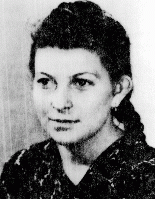
-
Dosia Szabszevicz
ID CardDosia, her older sister and parents lived on her grandfather's estate in the town of Ozorkow, eight miles from Lodz. Dosia's parents were secular Jews. They spoke both Polish and Yiddish to each other, but only Polish to their children. Dosia's father worked as an accountant, and her mother was active in organizing charity events for several of Ozorkow's Jewish organizations. 1933-39: A few days after Germany invaded Poland in 1939, Dosia saw the Polish army retreat through Ozorkow, carrying their wounded…
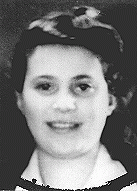
-
Alta Koppff Himmelfarb
ID CardThe daughter of a rabbi, Alta was one of six children raised in a Yiddish-speaking Jewish family in the town of Koprzewnica [in Poland]. Alta was one of the prettiest girls in town, and when she was 19 she married Shaul Himmelfarb, a childhood friend. Shaul opened a grocery store, and Alta ran the store on market days when Shaul was away buying merchandise. The couple had three children. 1933-39: On September 1, 1939, Germany invaded Poland. Soon after, German troops entered Koprzewnica. While fighting…
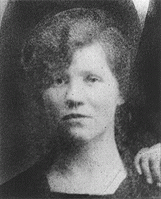
-
Leon Kusmirek
ID CardLeon was the oldest of two boys born to a Jewish family in Zgierz, a central Polish town in the heart of Poland's textile producing region. The family lived at 15 Konstantynowska Street. Leon's father worked at a textile factory. At age 7, Leon began attending public school in the morning and religious school in the afternoon. 1933-39: On Friday, September 1, 1939, Leon's mother had just returned from the market when the family saw German planes. On Sunday they flew over again, lower, panicking the city.…
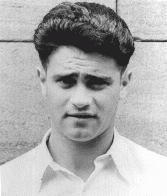
-
Josef Edelstein
ID CardJosef was one of seven children born to a Jewish family in the Czechoslovakian village of Hvozdnice. After graduating from school, Josef worked as a salesman in Vienna. In 1912 he married Ida Kohn, and the couple had a son before he left to fight for Austria in World War I. After the war, they had a daughter. 1933-39: Because of the economic depression of the 1930s, it was difficult for Josef to make a living in his wholesale shoe business. In 1938 the Germans annexed Austria [the Anschluss], and soon…
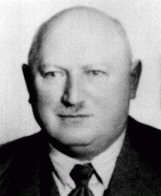
-
Leo Falkenstein
ID CardOne of three children, Leo grew up in the small town of Hochneukirch, 20 miles northwest of Cologne. As an adult, Leo entered his father's cigar manufacturing business, "Isak Falkenstein and Sons." Leo and his wife, Bertha, lived in a house next to Leo's parents. Leo and Bertha had six children whom they raised in the Jewish faith. 1933-39: Leo and Bertha's daughter Johanna has brought her two girls to live with them for a while here in Hochneukirch. Johanna's husband, Carl, has been having trouble…
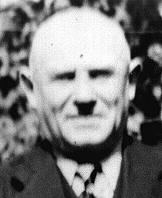
-
Bertha Falkenstein
ID CardOne of two children, Bertha grew up in the small village of Bergheim where her father was a farmer. After she married Leo Falkenstein, the couple settled in Hochneukirch, 20 miles northwest of Cologne. There her husband was employed in his father's cigar manufacturing business, "Isak Falkenstein and Sons." Bertha and Leo had six children whom they raised in the Jewish faith. 1933-39: In 1937 Bertha's daughter Johanna brought her two girls to live briefly with them in Hochneukirch. Johanna's husband, Carl,…
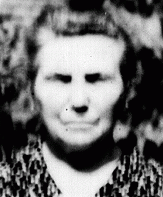
-
Elya Rosenblat
ID CardElya, also known as Eli, was the eldest of three sons born to Yiddish-speaking Jewish parents. When Elya was a child his family moved to the industrial city of Radom, located about 60 miles south of Warsaw. After completing school in Radom, Elya apprenticed to become a women's tailor. Eventually, he became licensed as a master tailor. 1933-39: Elya married in 1936 and had a daughter one year later. He and his wife lived on Zeromskiego Street across from Elya's younger brother, Itzik, who was also a…
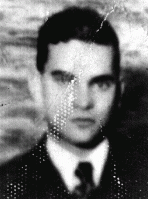
-
Judith Schwed
ID CardJudith was the older of two children born to Jewish parents in the town of Kiskunfelegyhaza in southeastern Hungary. Her mother, Anna, and her mother's sister, Kornelia, were close in age and had a contest to see who would be the first to have a baby. Judith's Aunt Kornelia won the contest and cousin Maria was born in December 1931, just three weeks before Judith. 1933-39: Judith's father had a prosperous wholesale business that sold goose meat, down, feathers and quilts. In 1939, the same year that…
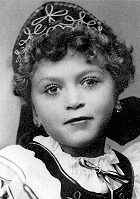
-
Shlomo Szczupakiewicz
ID CardShlomo was the youngest of four brothers born to a Jewish family in the northern Polish town of Malkinia. During World War I, Shlomo served as a male nurse. After the war, he worked as a grain merchant in the Malkinia area, just as his father had. In 1929 he married Pesia Ander, and a year later their first child, Ida, was born. 1933-39: In September 1939, before the invading Germans reached Malkinia, Shlomo fled with his family to the countryside. Exhausted, they returned to their house in Malkinia only…
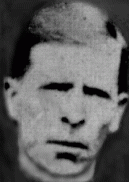
-
Machla Weiner
ID CardMachla was one of six children born to the Sandlers, a Jewish family in the Ukrainian village of Vachnovka. In 1912 Machla married Isaac Weiner, and by the late 1920s they had four sons and two daughters. Their oldest son died of scarlet fever in 1927. Hoping to find employment, Machla's husband moved the family in 1929 to the nearby city of Vinnitsa, which by then was part of the Soviet Union. 1933-39: In the early 1930s a severe famine swept the area. Machla's family survived, but times were hard. Isaac…
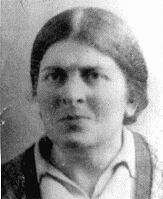
-
Olympic Games in Berlin
FilmThe 1936 Summer Olympic Games were held in Berlin. For two weeks, Adolf Hitler camouflaged his antisemitic and expansionist agenda while hosting the games. Hoping to impress the many foreign visitors who were in Germany for the games, Hitler authorized a brief relaxation in anti-Jewish activities (including the removal of signs barring Jews from public places). The games were a resounding propaganda success for the Nazis. They presented foreign spectators with the image of a peaceful and tolerant Germany.…
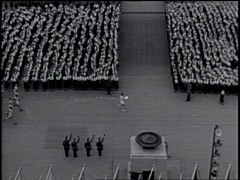
-
Opening of 1936 Summer Olympic Games
FilmIn 1933, Nazi Party leader Adolf Hitler became chancellor of Germany and quickly turned the nation's fragile democracy into a one-party dictatorship. Police rounded up thousands of political opponents, detaining them without trial in concentration camps. The Nazi regime also put into practice racial policies that aimed to "purify" and strengthen the Germanic "Aryan" population. A relentless campaign began to exclude Germany's one-half million Jews from all aspects of German life. For two weeks in August…
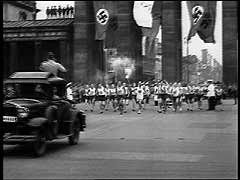
-
David Stoliar describes conditions on board the Struma during the journey to Istanbul
Oral HistoryIn 1936, David moved to Bucharest to live with his father. As Romania came under German influence, Romanian authorities introduced increasingly harsh measures against Jews. Antisemitic agitation increased and Jews came under attack in the streets of Bucharest and in other public places. David's father decided David should leave the country and arranged passage for him to Palestine. In December 1941, David left Romania from Constanta, a port city on the Black Sea, on the Struma, an old cattle boat. The…
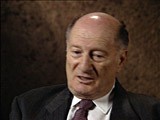
-
David Stoliar describes holding onto a piece of wreckage from the deck of the torpedoed Struma
Oral HistoryIn 1936, David moved to Bucharest to live with his father. As Romania came under German influence, Romanian authorities introduced increasingly harsh measures against Jews. Antisemitic agitation increased and Jews came under attack in the streets of Bucharest and in other public places. David's father decided David should leave the country and arranged passage for him to Palestine. In December 1941, David left Romania from Constanta, a port city on the Black Sea, on the Struma, an old cattle boat. The…
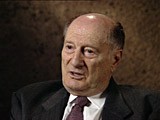
-
David Stoliar describes how he survived the sinking of the Struma
Oral HistoryIn 1936, David moved to Bucharest to live with his father. As Romania came under German influence, Romanian authorities introduced increasingly harsh measures against Jews. Antisemitic agitation increased and Jews came under attack in the streets of Bucharest and in other public places. David's father decided David should leave the country and arranged passage for him to Palestine. In December 1941, David left Romania from Constanta, a port city on the Black Sea, on the Struma, an old cattle boat. The…
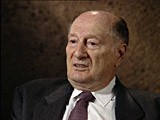
-
Jerry von Halle describes hiding in Amsterdam
Oral HistoryIn 1933 Jerry's family moved from Hamburg to Amsterdam. The Germans invaded the Netherlands in 1940. In 1941, Jerry's brother perished in Mauthausen. Jerry and his parents went into hiding first in Amsterdam and then in a farmhouse in the south. The Gestapo (German Secret State Police) arrested Jerry's father in 1942, but Jerry and his mother managed to return to their first hiding place. They were liberated in Amsterdam by Canadian and Jewish Brigade troops.
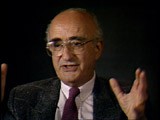
-
Jerry von Halle describes hunger while in hiding in Amsterdam
Oral HistoryIn 1933 Jerry's family moved from Hamburg to Amsterdam. The Germans invaded the Netherlands in 1940. In 1941, Jerry's brother perished in Mauthausen. Jerry and his parents went into hiding first in Amsterdam and then in a farmhouse in the south. The Gestapo (German Secret State Police) arrested Jerry's father in 1942, but Jerry and his mother managed to return to their first hiding place. They were liberated in Amsterdam by Canadian and Jewish Brigade troops.
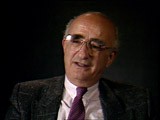
-
Carla Heijmans Lessing describes the fear her family felt while in hiding
Oral HistoryAfter invading the Netherlands in 1940, the Germans imposed anti-Jewish measures. With the aid of a Catholic priest who helped Jews find hiding places, Carla, her mother, and her brother went into hiding in August 1942 to avoid deportation to work camps. They had to leave the hiding place after three months and with the priest's help found shelter in Delft with a Catholic family which had seven children. They remained in hiding there for 30 months, until liberation in May 1945.
